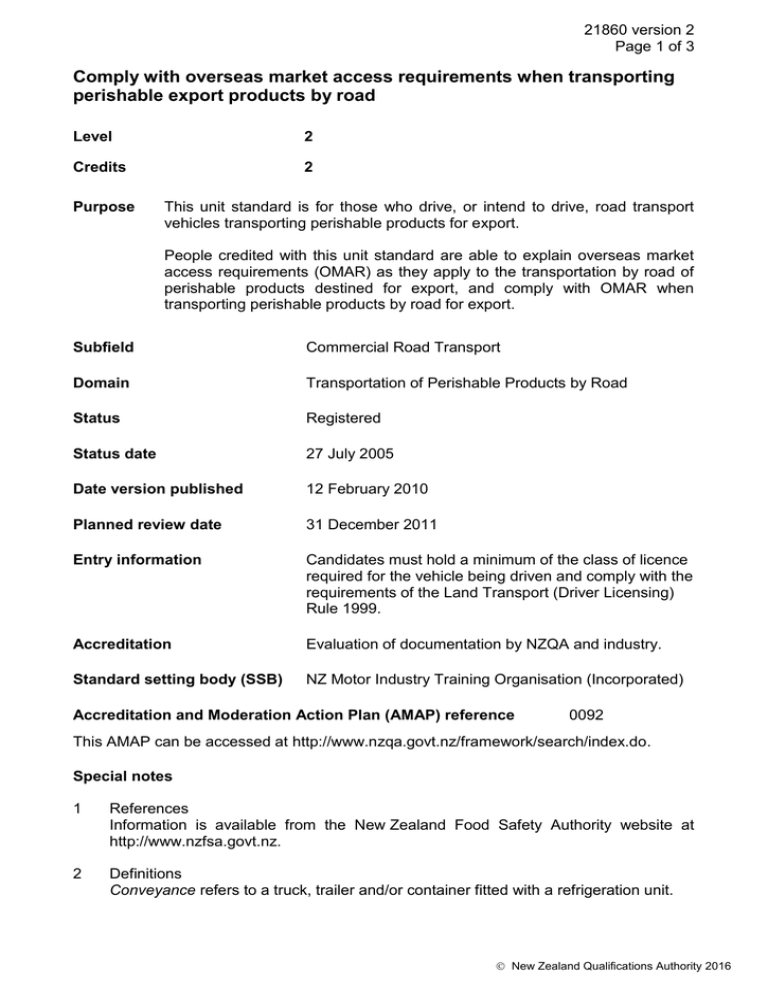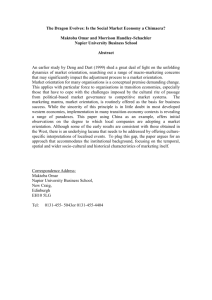Comply with overseas market access requirements when transporting
advertisement

21860 version 2 Page 1 of 3 Comply with overseas market access requirements when transporting perishable export products by road Level 2 Credits 2 Purpose This unit standard is for those who drive, or intend to drive, road transport vehicles transporting perishable products for export. People credited with this unit standard are able to explain overseas market access requirements (OMAR) as they apply to the transportation by road of perishable products destined for export, and comply with OMAR when transporting perishable products by road for export. Subfield Commercial Road Transport Domain Transportation of Perishable Products by Road Status Registered Status date 27 July 2005 Date version published 12 February 2010 Planned review date 31 December 2011 Entry information Candidates must hold a minimum of the class of licence required for the vehicle being driven and comply with the requirements of the Land Transport (Driver Licensing) Rule 1999. Accreditation Evaluation of documentation by NZQA and industry. Standard setting body (SSB) NZ Motor Industry Training Organisation (Incorporated) Accreditation and Moderation Action Plan (AMAP) reference 0092 This AMAP can be accessed at http://www.nzqa.govt.nz/framework/search/index.do. Special notes 1 References Information is available from the New Zealand Food Safety Authority website at http://www.nzfsa.govt.nz. 2 Definitions Conveyance refers to a truck, trailer and/or container fitted with a refrigeration unit. New Zealand Qualifications Authority 2016 21860 version 2 Page 2 of 3 Cross-docking refers to movement of goods from vehicle to vehicle, vehicle to loading dock, loading dock to vehicle, undertaken at an intermediate stage during transport to facilitate the delivery operation. Overseas market access requirements (OMAR) are country-specific, and place performance standards on transporters of export dairy, meat, and fish products intended for human consumption. Perishable products refers to products for human consumption that are time-, temperature-, handling- and/or regulatory-sensitive such as meat, seafood, baked goods, confectionery, dairy products, breads, fruit and vegetables. Supply chain refers to all the parts that make up the supply delivery process. The parts may include but are not limited to – grower, manufacturer, supplier, transporter, retailer, exporter. Traceability is a system of recording and monitoring the temperature and quality of perishable products during transportation from manufacturer to retailer. 3 The legal requirements relevant to this unit standard include: Animal Products Act 1999; Land Transport Act 1998. 4 Any new, amended, or replacement Acts, regulations, Rules, standards, codes of practice, New Zealand Food Safety Authority or NZ Transport Agency requirements or conditions affecting this unit standard will take precedence for assessment purposes, pending review of this unit standard. Elements and performance criteria Element 1 Explain OMAR as they apply to the transportation by road of perishable products destined for export. Range at least one of – dairy, animal, seafood products. Performance criteria 1.1 OMAR is explained in terms of eligibility of companies to transport products, and to transfer products between conveyances at road transport depots using an approved vehicle docking facility (VDF). 1.2 Compliance with OMAR is explained in terms of integrity of supply chain and product, and official assurance programme requirements. 1.3 OMAR applicable to maintaining security of products is explained in terms of general and specific requirements. Range contamination, tampering. New Zealand Qualifications Authority 2016 21860 version 2 Page 3 of 3 Element 2 Comply with OMAR when transporting perishable products by road for export. Performance criteria 2.1 Documentation accompanying perishable products destined for export complies with OMAR and NZ Food Safety Authority requirements. 2.2 Driver actions comply with OMAR in terms of maintaining security of perishable products intended for export. 2.3 Driver’s performance of traceability procedures for perishable product intended for export complies with OMAR. 2.4 Driver actions during pick-up, line haul, delivery, and/or cross-docking comply with OMAR in terms of minimising the potential for products intended for export to be downgraded to the domestic market as a result of cross-contamination of product. Please note Providers must be accredited by NZQA, or an inter-institutional body with delegated authority for quality assurance, before they can report credits from assessment against unit standards or deliver courses of study leading to that assessment. Industry Training Organisations must be accredited by NZQA before they can register credits from assessment against unit standards. Accredited providers and Industry Training Organisations assessing against unit standards must engage with the moderation system that applies to those standards. Accreditation requirements and an outline of the moderation system that applies to this standard are outlined in the Accreditation and Moderation Action Plan (AMAP). The AMAP also includes useful information about special requirements for organisations wishing to develop education and training programmes, such as minimum qualifications for tutors and assessors, and special resource requirements. Comments on this unit standard Please contact NZ Motor Industry Training Organisation (Incorporated) info@mito.org.nz if you wish to suggest changes to the content of this unit standard. New Zealand Qualifications Authority 2016






